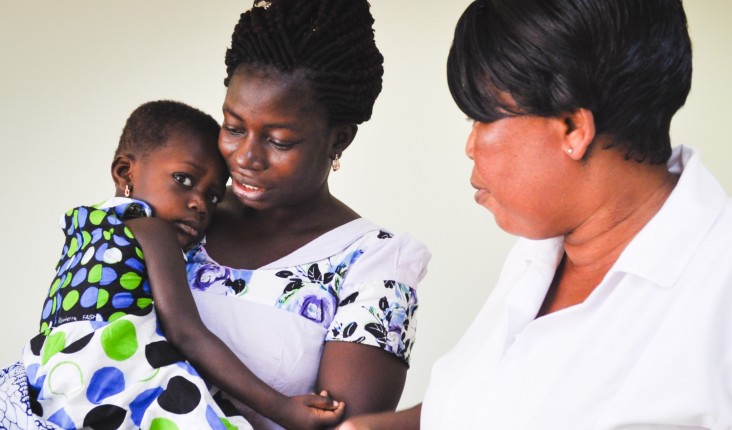
The goal of USAID’s integrated health, population, and nutrition program is to increase equitable access and use of quality health care. Over the next five years, USAID will support Ghana’s efforts to expand coverage and quality of health services through scaling up interventions to: reduce unintended pregnancy; reduce maternal mortality; reduce newborn and under-five mortality; improve nutritional status; and reduce the spread of HIV among the most-at-risk populations.
USAID assistance supports and complements the priorities of the Government of Ghana for the health sector. Our investment is in sustainable, high impact initiatives.
In alignment with the U.S. Global Health Initiative (GHI), USAID focuses on five regions of Ghana—Northern, Volta, Greater Accra, Central, and Western Regions. We support a combination of activities to improve the health behaviors of families and communities, and to enrich the quality and delivery of health services and systems.
Malaria
As part of the President’s Malaria Initiative, USAID is increasing coverage through four proven and highly effective malaria prevention and treatment measures: insecticide-treated mosquito nets; indoor residual spraying; accurate diagnosis and prompt treatment with artemisinin-based combination therapies (ACTs); and preventive treatment for pregnant women. In 2014 USAID/Ghana:
- Distributed 2,537,900 insecticide treated nets;
- Purchased 5,700,000 malaria rapid diagnostic tests and 3,698,170 ACTs.
- Trained nearly 20,000 health workers.
Maternal, Neonatal and Child Health (MNCH)
USAID programming focuses on improving access, utilization, and quality of essential maternal, newborn, and child health services. Activities incorporate the integrated management of maternal services and childhood diseases, including malaria, diarrhea, pneumonia, and malnutrition. Maternal health activities focus on delivering quality service, training, and equipment.
- In the three regions where USAID focused its MNCH efforts from 2009 to 2014, institutional maternal mortality decreased by 20 percent.
- In 2014, USAID supported 333 facilities to provide appropriate life-saving care for mothers and babies and 65,132 deliveries were assisted by a skilled birth attendant.
Family Planning & Reproductive Health (FP/RH)
Through services offered at community facilities and communication to encourage social and behavior change, USAID is tackling an unmet need for family planning by increasing understanding about and access to a range of contraception methods.
- In 2014, USAID programs provided 1,253,506 years of Couple Years Protection.
- 98 percent of USAID-assisted service delivery sites provided family planning counseling and/or services.
- To improve access to contraceptives, USAID’s social marketing program has established over 5,000 sites for sale of contraceptives including 445 community-based distributors.
Nutrition
As part of the GHI and Feed the Future Initiatives, USAID works with the Government of Ghana to improve the nutritional status of women and young children. Activities include strengthening communities to manage and prevent malnutrition; advocacy for nutrition programming; improvement of nutrition-related behaviors; promoting healthy infant feeding practices and care; and encouraging dietary diversity. USAID is also working to increase and level household income through an integrated nutrition and economic resiliency project.
- In 2014, USAID supported 1,160 health facilities to manage acute malnutrition and trained 1,268 health workers in child health and nutrition.
- USAID-supported nutrition programs reached 202,084 children under five.
- Through the Resiliency in Northern Ghana project, USAID is providing direct government-to-government assistance to 10 districts to reduce poverty and improve the nutritional status of vulnerable populations.
HIV/AIDS
The President's Emergency Plan for HIV/AIDS Relief (PEPFAR) program in Ghana provides leadership and advisory support for key populations, specifically–anti-stigma and gender-based violence against people living with HIV/AIDS. Projects support policies and services for prevention, care and treatment of key populations and people living with HIV/AIDS, as well as innovative and evidence-based interventions to reduce new HIV infections.
Health Systems Strengthening
USAID supports the strengthening of Ghana’s health system through improved policy and providing assistance in leadership development, as well as through financial and management support systems at decentralized levels of the Ghana health sector. USAID provides oversight to ensure a high quality of care at all levels of the health system. In addition, USAID is supporting the continued strengthening of the National Health Insurance Scheme, a model of domestically financed social health insurance which provides a comprehensive health benefits package to about 40 percent of the Ghanaian population.
- In 2014, 4,750 new health care workers graduated from a pre-service training institution supported by USAID;
- 93 percent of USAID-supported facilities were using District Health Information System to report timely and accurate data;
- The portion of USAID-supported service delivery points experiencing a stockout was reduced from 96 percent to 76 percent from 2013-2014.








Comment
Make a general inquiry or suggest an improvement.